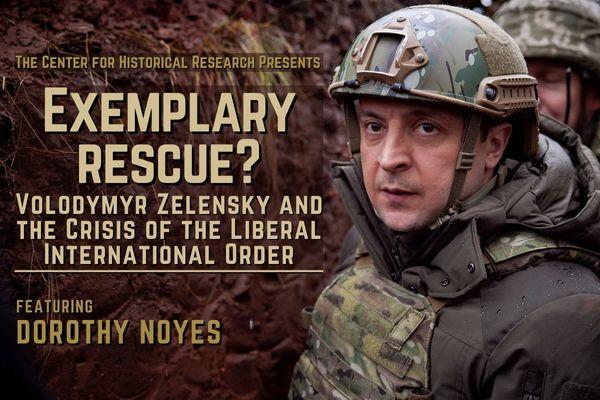
Volodymyr Zelensky is not the first actor to have come to the rescue of liberal principles in a time of crisis. Indeed, a charismatic gesture of self-sacrifice is the inevitable turning point in liberalism's formulaic narrative of decadence and recovery. In accounts built on this formula, the personal performance serves as a general call to order, an example that not only validates neglected norms but inspires both active emulation and mimetic identification. A year on from the Russian invasion and Ukraine's remarkable response, I will examine the Western uptake of Ukraine's and Zelensky's astute self-presentation as exemplars of liberal democracy. While this well-coordinated performance complex has served the immediate purpose of garnering Western resources for the war effort, the chain of emulations prompted by it has generated its own logic. The exemplary lineage claimed in Zelensky's performances has arguably encouraged a Zeitenwende straight back to the twentieth century. In contrast, Ukraine's earlier involvement in another chain of emulation, the Color Revolutions and the Arab Spring, evoked the forward-moving, foundational episodes of the liberal order rather than its subsequent defense. This second exemplary network became highly consequential for Ukraine's relationship with Russia, but was insufficient to garner meaningful Western support.
Dorothy Noyes is Arts & Sciences Distinguished Professor of English, Professor of Comparative Studies, and Director of the Mershon Center for International Security Studies at the Ohio State University. Noyes studies political performance and the traditional public sphere in Europe, with an emphasis on how shared symbolic forms and indirect communication mediate coexistence in situations of endemic social conflict. She also writes on folklore theory and the international policy careers of culture concepts. Among her books are Fire in the Plaça: Catalan Festival Politics After Franco (University of Pennsylvania Press, 2003); Humble Theory: Folklore’s Grasp on Social Life (Indiana University Press, 2016); and Sustaining Interdisciplinary Collaboration: A Guide for the Academy, co-authored with Regina F. Bendix and Kilian Bizer (University of Illinois Press, 2017). Her current book projects are Exemplary Failures: Gesture and Emulation in Liberal Politics and, co-edited with Tobias Wille, The Global Politics of Exemplarity.
